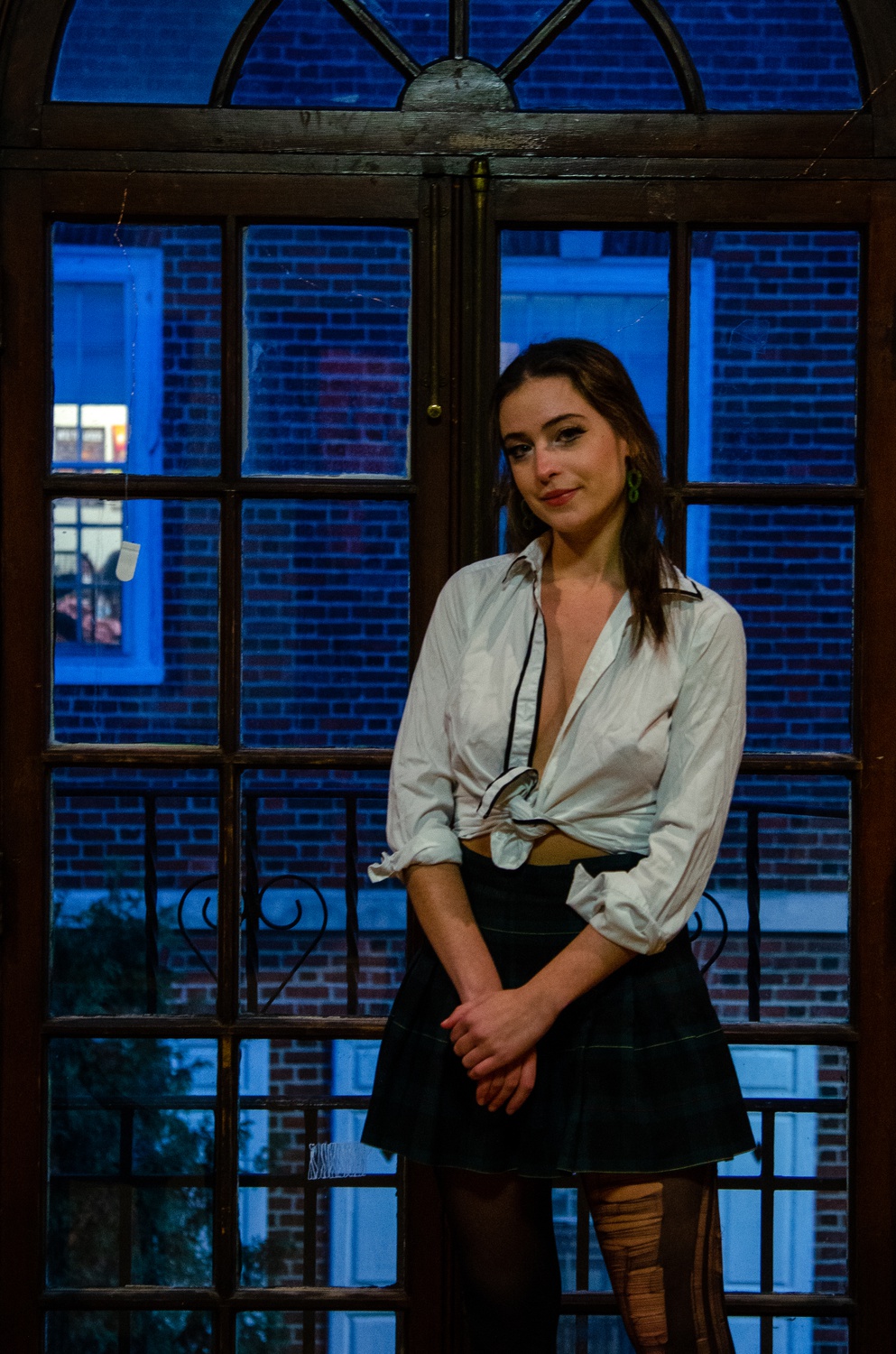
Best Dressed: Juliet Isselbacher
Juliet E. Isselbacher ’22-’23 has always hated pants. When I meet her in the lobby of Quincy House for our interview, she’s wearing a white tank top, double-winged eyeliner, green snake earrings, and turquoise corduroys — but she notes that the pants are a rarity. She usually prefers to stick to skirts and dresses because they’re more comfortable.
“I just bought my first pair of jeans in 10 years the other day,” she says, but stipulates that they’re baggy dad jeans. “Skirts are my thing,” she adds.
For Isselbacher, a Crimson editor, dressing well and feeling comfortable aren’t mutually exclusive. “[Fashion] doesn’t have to be something that’s formal or stilted or uncomfortable,” she says. “It can just show that you’re bringing yourself to the table and wanting to engage with people on the terms that you’re expressing.”
But she notes that people sometimes interpret her “comfortable” clothing as unusually put-together. “People will be like, ‘Oh, what are you dressed up for? What event are you going to?’” she laughs. “And I’ll say, ‘Nothing, this is just what I’m wearing today.’”
She picked up today’s earrings from a stand at the Head of the Charles Regatta. Earrings are an easy way to elevate an outfit, she says, since “they’re easy to put on, and they add a lot.” She adds that makeup is another way to establish your personal style.
“I feel like it’s really no different from clothing. Some people treat makeup like a means by which to fix imperfections or cover things up. But for me, it’s like I put on clothes in the morning,” she says.
Isselbacher has gone through a turquoise mascara phase, a purple eyeliner phase, and a blue eyeliner phase. For a while, she would draw dots or designs around her eyes, or put white eyeliner in the corner of her eye or between wings. Right now she’s in a “double-wing phase” with her eyeliner but notes that she changes patterns about every three months.
“I honestly don’t really feel like myself until I put my eyeliner on in the morning. That troubles me to some degree, the sense of alienation,” she says. “But also, on the flip side, I have agency over how I’m presenting myself to other people.”
Isselbacher doesn’t have specific adjectives to describe her style or style icons she aspires to dress like. “It just has to be about what you like, so it’s really hard to say,” she says. “I pick up on things I like very subconsciously and incorporate them one by one.”
In addition to skirts and dresses, Isselbacher cites her “huge” Naked Wolfe boots as a wardrobe staple. “The boots I wear now are 6 inches, and I actually wore my last pair every day last year until the soles cracked,” she says. “I like being tall.”
Isselbacher is a Philosophy concentrator, as well as one of The Crimson’s News comp directors. She started college on the pre-med track because she wanted to be a neurologist, but she changed paths when she noticed that she was most drawn to the ethical questions raised in her psychology and history of science classes.
Now, she’s working on a thesis that looks the #MeToo movement in conversation with the ethics of belief and non-evidentialist epistemologies.
“I’m basically looking at very specific cases in which there’s really no evidence on either side when it comes to claims of sexual violence and harassment, and I’m seeing whether women who believe these claims have the right to do so under various frameworks that basically posit there are considerations beyond the evidence that bear on what we should believe,” she says.

Isselbacher’s study of philosophy extends to her role as Best Dressed, too.
She notes that dressing can be a reflection of the importance of externality to one’s self. “A lot of philosophical traditions separate the mind and body and focus on the mind as the thing that makes us human, as the central element of the self, and kind of shuns the body or deems it secondary,” she says. “Inhabiting your body in a way where you draw explicit attention to that resists the idea that what makes you you is specifically pure, disembodied thought, and recognizes that the way we move through the world and the way we present ourselves is important to selfhood.”
In a class she took on Chinese philosophy, Isselbacher wrote about dressing as a form of etiquette — a way to “signal to people that I care how they perceive me, and I’m making efforts towards that effect.”
“I’m trying to engage with them authentically and show them who I am,” she says. “It’s kind of like a sign of goodwill in that sense.”
—Associate Magazine Editor Sarah W. Faber can be reached at sarah.faber@thecrimson.com.


